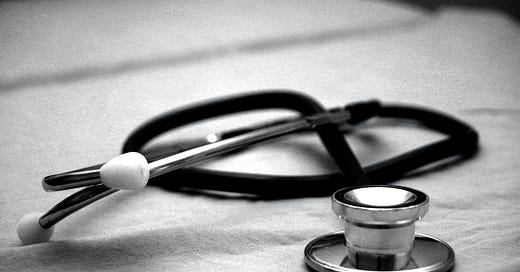She listened.
Strange that this simple fact was startling, but we’ve all been brushed aside, shrunk smaller as our concerns were swatted away like pesky flies.
From the second she stepped into the pre-op room, she looked at me and she listened.
“Have you ever had any adverse reactions to anesthesia?”
The question is always perfunctory, though my response is anything but. Each time the words rush out like a stream, running faster than I can control.
Yes, I have; yes, anesthesiologists always warn me to say yes; I’ve had anesthesia wear off during surgery; I yelled, “I can feel everything!” and nothing makes an OR move faster; I guess I have a high metabolism; that’s what they tell me to say; it was awful, really awful.
She looked deep into my face with compassion. Between her scrub cap and her mask, I could see the edge of her crown of curls and her empathetic eyes.
“That must have been terrible,” she said with concern. “I’m so sorry that happened.”
Never had a doctor taken this tone. Never had anyone apologized.
I caught the lump in my throat. Suddenly memories flooded my muscles: the alarm, the terror, the pain where there should have been none, the anxiety that now creeps into my bones every time the needle for anesthesia is placed into my veins. Knowing what happened once makes it hard to trust again.
“We’re going to take good care of you. I’m going to stay with you the whole time. And I’ll make sure we have extra of everything on hand. Thank you for telling me.”
She never left.
The dark of her eyes stayed with me as they wheeled me back into surgery, as aides helped me shift from bed to table, as nurses flocked around my body, placing pillows and lines and leads. She held my shoulder in the middle of the flurry, a radiant touch.
Every other anesthesiologist I’d ever met—the men who whisked into delivery rooms and placed needles in my back, the forgettable faces who drifted in and out of operating rooms—was the exact opposite of her. My body started to ease as she spoke, lilting and low under the rumble of monitors and machines.
When she asked me to roll slightly so she could place more sensors on each side, we both chuckled at the sudden cool of her hands. Like stepping into water, we laughed. Like the first familiar freeze of the lake.
I saw the apple cheeks of her smile beneath the paper mask, and I smiled back. Soon I would slip into sleep under her watch. The surgeon would operate on my cheek, shown to me later in slides and photos of pink skin and fresh sutures. An infection would erupt and then subside, the usual peaks and valleys of wounding and healing over weeks and months.
But for now, she stayed at the holy center of my sight. Above my head, she kept her hand steady on my shoulder, promising all would be well. The peace of her presence was palpable. I closed my eyes.
Later that night I checked the patient portal after we got home, wanting to jog my memory about medications and dosages, hoping to ease the pain of recovery. My husband and I were chatting about stitches and swelling as I clicked through tabs to find the right page.
Suddenly the anesthesiologist’s face jumped off the screen. And then I caught my breath—
Her name was Peace.





Tears were welling as I approached the end of this essay, the last line caused my heart to swell so much that they tumbled down my cheeks.
Just beautiful, Laura !!